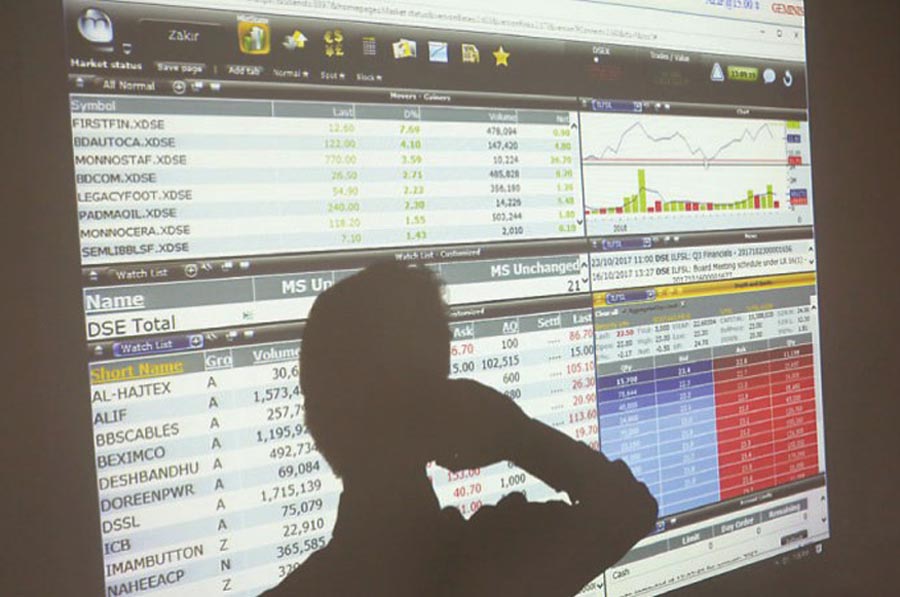Stocks continue to fall on strict disciplinary measures against banks, NBFIs

Published :
Updated :

The equity index plunged further on Wednesday as selling pressure persisted, dragging the prime index of the Dhaka bourse to multi-year low, as investors found no immediate solution to the prevailing dismal market outlook.
Jittery investors dumped their holdings to escape further losses in the absence of any strong catalyst while the ongoing political tension and the restriction on 18 listed banks to pay dividends added to the strain on the market.
Due to the central bank's strict regulation the banks, which have taken deferral facilities for meeting their provision shortfall, will not be allowed to pay dividends for 2024 onwards.
The central bank is also tightening its grip on troubled non-bank financial institutions (NBFIs). As per the central bank's plan, 20 NBFIs may be merged or liquidated.
Therefore, almost all banks and NBFIs experienced sharp price corrections, leading the prime index to a fresh five-year low.
Although the regulator introduced several initiatives to strengthen governance in listed companies, the measures fell short to create optimism surrounding the secondary market.
The benchmark index of the Dhaka Stock Exchange lost 62 points or 1.34 per cent to 4,615, the lowest since August 2020 when the Covid pandemic wreaked havoc on the economy.
The prime index plunged 186 points in the past six consecutive sessions while the index tumbled 1400 points or 23 per cent since the recent peak attained immediately after the ouster of Hasina-led government in August last year.
The market-cap of the DSE shed Tk 723 billion since August last year to Tk 6.42 trillion on Wednesday.
"The heightened political unrest and pre-budget uncertainties continued to dominate the trading floor," said EBL Securities, in its regular market analysis.
The factors such as high interest rates, declining corporate profitability, legacy of negative equity, growing economic headwinds and political uncertainty weakened investor confidence.
"Due to the continuous market decline, many margin accounts came under forced sale, which exacerbated the index plunge," said Md Sajedul Islam, managing director of Shyamol Equity Management.
Moreover, institutional investors are mostly in a hands-off position due to a liquidity crunch while small investors are not confident enough to inject fresh funds into the market, he added.
Investors dumped shares of bank, non-bank financial institutions, telecom, engineering and food sector stocks, exerting downward pressure on the indices.
Price fall of selective large-cap stocks, such as Islami Bank, Walton, Al-Arafah Islami Bank, BAT Bangladesh and Mercantile Bank, dragged the prime index down significantly. They jointly accounted for one-third fall of the key index.
The blue-chip index, a group of 30 prominent companies, lost 16 points to 1,708 while the DSES Index, which represents Shariah-based companies, shed 16 points to 1,008.
Trading activities remained sluggish, with turnover down to Tk 2.65 billion from Tk 2.73 billion the day before.
Investors were mostly active in the banking sector, which accounted for 16 per cent of Wednesday's turnover, followed by the food (15 per cent) and pharma (9 per cent) sectors.
Of the 398 issues traded, 295 declined, 63 advanced, and 40 remained unchanged on the DSE trading floor.
Beach Hatchery was the most-traded stock, with shares worth Tk 104 million changing hands, closely followed by Fu-Wang Food, Orion Infusion, BRAC Bank, NRB Bank.
The port city bourse, Chittagong Stock Exchange, also ended lower, with the CSE All Share Price Index (CASPI) shedding 139 points to 13,025 while the Selective Categories Index (CSCX) losing 90 points to 7,943.
babulfexpress@gmail.com


 For all latest news, follow The Financial Express Google News channel.
For all latest news, follow The Financial Express Google News channel.